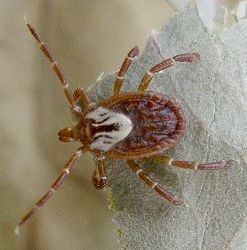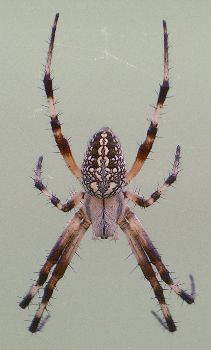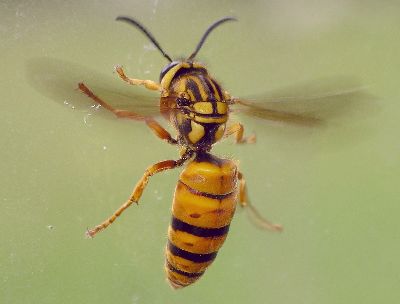July, 2007
Spiders and Leeches and Wasps, Oh My!
by Valerie
During the warmer months of the year, I spend considerable time photographing and researching insects, spiders and reptiles. I walk out in gardens, woods, and fields in our central Texas area several times a week, coming into close contact with all manner of crawly critters. Compared to many people, I am relatively at ease when dealing with the various less-than-adorable fellow inhabitants of our world. In fact, most of my friends probably think that I'm just naturally comfortable with minute creatures that might bite or sting or creep about in an unseemly manner. Not so. While I recognize and understand the behaviors of many of these beasts, I still have the usual repulsions and reactions, and have had plenty of nasty encounters through the years.

Growing up in a family that valued time spent outdoors, it is no wonder that I developed a love of nature. All my experiences, though, were not storybook pleasant. My mother had a profound fear of spiders and I witnessed the consequences of multiple stings when a bumblebee flew up my father's pant leg. I encountered wasps, wood ticks, and deer flies. The results were, as you might expect, rather disagreeable. I'll admit that I was lucky from the start in that I am not particularly allergic to such common complaints as mosquito bites, wasp and bee stings, and poison ivy. However, I quickly learned that the bites of spiders and deer flies were so uncomfortable that I wanted to do anything possible to avoid them.
A common theme in my childhood experiences with small frightening beasts was "it will happen, so learn to deal with it." When I was quite small, suddenly finding that I'd walked into a field of tall grass surrounded by large spiders in webs was less than joyful, and I can remember having the urge to scream uncontrollably. Ultimately, it made more sense to carefully pick my way out of the nightmare, and try to be more careful in the future. Being confronted with a big and aggressive garter snake on our back porch, I did give vent to my instincts, but it resulted in a neighbor coming to the rescue and killing the snake, which made me feel badly later. Wolf spiders frequently invaded our home in Illinois, and though I despised them, it became a habit to remain perfectly still until the scary creature had walked OFF of my foot or hand before thrashing about wildly and screaming. There was less chance of being bitten that way.
 Some of my earliest outdoor lessons included how to handle dangerous creatures safely. I can't remember how young I was when I learned that small snakes had to be picked up close to the head so they couldn't reach around and bite. Snapping and softshell turtles could not be handled in the same way as other pond turtles due to their long and flexible necks. My father's fishing bait presented equal challenges. Crayfish and hellgrammites could pinch hard enough to draw blood, but if grabbed in the right spot, they were not supple enough to twist around and give a nip. I was surprised to be bitten by such seemingly harmless insects as dragonflies and grasshoppers. Once I knew that they COULD bite, though, I then devised ways to avoid giving them the chance.
Some of my earliest outdoor lessons included how to handle dangerous creatures safely. I can't remember how young I was when I learned that small snakes had to be picked up close to the head so they couldn't reach around and bite. Snapping and softshell turtles could not be handled in the same way as other pond turtles due to their long and flexible necks. My father's fishing bait presented equal challenges. Crayfish and hellgrammites could pinch hard enough to draw blood, but if grabbed in the right spot, they were not supple enough to twist around and give a nip. I was surprised to be bitten by such seemingly harmless insects as dragonflies and grasshoppers. Once I knew that they COULD bite, though, I then devised ways to avoid giving them the chance.
I learned to deal with the creatures we encountered outside our familiar Midwest area, such as those found in the ocean. It was obvious that sea urchins, with their long spines, were best given wide berth. However, it was not easy to avoid the jellyfish, bits of which would end up in our swimsuits and cause all manner of painful itching. I never knew that oysters had such razor sharp shells until experiencing them myself. The worst lesson I learned was about bristleworms. I'd found one while snorkeling and picked it up to show my mother, only too late discovering that the bristles seemed to come off and cover my hands. After three hours of agony before the pain subsided, I could only wonder why I'd never heard about this before.
Perhaps the most annoying pests were the ones that do their work unseen. Ticks are a constant issue in the summer and it was common to find them attached to us after a day spent out fishing or hiking. We used various methods to get them to back out so that their head was not left embedded in our flesh. To this day, I prefer to use rubbing alcohol because it works well on both us and dogs. I discovered no-see-ums when we traveled to the Gulf coast in the summer. Their bites were painful enough, but the fact that they could get through the screening on our tent was extraordinarily annoying. At least mosquitoes could be kept outside by the mesh. Currently, chiggers are one of my worst irritations. I've never seen one due to their small size, but I've had to deal with hundreds of bites at a time. These can be kept to a minimum by the application of just about any kind of bug spray to one's pant legs and shoes, IF you know to prepare ahead.

Sometimes I've been surprised by my lack of a panic reaction at situations that I should have found far more repulsive than I did. Wading in a small creek in Wisconsin one summer, I stepped out of the water to find that one of my bare feet appeared to have a sock. It turned out to be hundreds of tiny black leeches. I couldn't believe how many there were, but started scraping them off without any feeling of disgust at all - it was like cleaning the mud off my shoes. Another time, when I was about 10 years old, I was walking barefooted in our backyard and felt a sharp prick on my toe. I'd kicked a honeybee that was visiting the clover in our grass. I pulled the bee off my toe and then watched in fascination as the stinger with its little poison sac continued to pump all by itself. I then carefully pulled that out as well and then promptly dismissed the incident. I cannot remember if it hurt afterward, but I do recall how strange that little disembodied stinger looked.
Other times I've reacted emotionally and regretted it. I was once kayaking and the deer flies were particularly bothersome. In frustration, I shook my head to get one out of my face and my glasses flew off into the water. It took a good 15 minutes of searching to reclaim them. Lesson learned.
So why do I love spending time outside with all these creatures that have the capabilities to make us so miserable? Although the impression of the bad bugs is great, they are a small percentage of the wildlife wonders that abound in our environment. Many small invertebrates are not really as menacing as they appear at first glance. Spiders, for instance, are more often benign than B-rated horror movies would lead us to believe. Wasps and bees are not "out to get us" and many other insects bite only in self defense. Some animals that we find repulsive, like maggots and slugs, will not harm us at all. In many cases, it is simply a matter of being more familiar with our fellow beings on this planet, so that we may understand, and therefore not fear, their unique lifestyles. Does knowing this make me refrain from letting out a yelp when I walk straight into a spider web across a woodland path? No, but it does help me recover my composure a bit quicker.
 Some of my earliest outdoor lessons included how to handle dangerous creatures safely. I can't remember how young I was when I learned that small snakes had to be picked up close to the head so they couldn't reach around and bite. Snapping and softshell turtles could not be handled in the same way as other pond turtles due to their long and flexible necks. My father's fishing bait presented equal challenges. Crayfish and hellgrammites could pinch hard enough to draw blood, but if grabbed in the right spot, they were not supple enough to twist around and give a nip. I was surprised to be bitten by such seemingly harmless insects as dragonflies and grasshoppers. Once I knew that they COULD bite, though, I then devised ways to avoid giving them the chance.
Some of my earliest outdoor lessons included how to handle dangerous creatures safely. I can't remember how young I was when I learned that small snakes had to be picked up close to the head so they couldn't reach around and bite. Snapping and softshell turtles could not be handled in the same way as other pond turtles due to their long and flexible necks. My father's fishing bait presented equal challenges. Crayfish and hellgrammites could pinch hard enough to draw blood, but if grabbed in the right spot, they were not supple enough to twist around and give a nip. I was surprised to be bitten by such seemingly harmless insects as dragonflies and grasshoppers. Once I knew that they COULD bite, though, I then devised ways to avoid giving them the chance.

